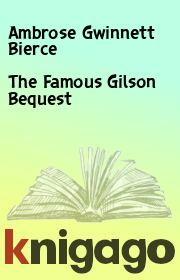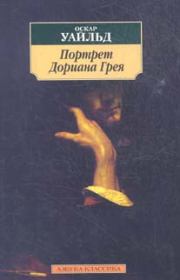Ambrose Gwinnett Bierce - The Famous Gilson Bequest
 | Название: | The Famous Gilson Bequest |
Автор: | Ambrose Gwinnett Bierce | |
Жанр: | Классическая проза | |
Изадано в серии: | неизвестно | |
Издательство: | неизвестно | |
Год издания: | - | |
ISBN: | неизвестно | |
Отзывы: | Комментировать | |
Рейтинг: | ||
Поделись книгой с друзьями! Помощь сайту: донат на оплату сервера | ||
Краткое содержание книги "The Famous Gilson Bequest"
Аннотация к этой книге отсутствует.
Читаем онлайн "The Famous Gilson Bequest". Главная страница.
The Famous Gilson Bequest by Ambrose Bierce
IT was rough on Gilson. Such was the terse, cold, but not altogether unsympathetic judgment of the better public opinion at Mammon Hill—the dictum of respectability. The verdict of the opposite, or rather the opposing, element—the element that lurked red-eyed and restless about Moll Gurney's "deadfall," while respectability took it with sugar at Mr. Jo. Bentley's gorgeous "saloon"—was to pretty much the same general effect, though somewhat more ornately expressed by the use of picturesque expletives, which it is needless to quote. Virtually, Mammon Hill was a unit on the Gilson question. And it must be confessed that in a merely temporal sense all was not well with Mr. Gilson. He had that morning been led into town by Mr. Brentshaw and publicly charged with horse stealing; the sheriff meantime busying himself about The Tree with a new manila rope and Carpenter Pete being actively employed between drinks upon a pine box about the length and breadth of Mr. Gilson. Society having rendered its verdict, there remained between Gilson and eternity only the decent formality of a trial.These are the short and simple annals of the prisoner: He had recently been a resident of New Jerusalem, on the north fork of the Little Stony, but had come to the newly discovered placers of Mammon Hill immediately before the "rush" by which the former place was depopulated. The discovery of the new diggings had occurred opportunely for Mr. Gilson, for it had only just before been intimated to him by a New Jerusalem vigilance committee that it would better his prospects in, and for, life to go somewhere; and the list of places to which he could safely go did not include any of the older camps; so he naturally established himself at Mammon Hill. Being eventually followed thither by all his judges, he ordered his conduct with considerable circumspection, but as he had never been known to do an honest day's work at any industry sanctioned by the stern local code of morality except draw poker he was still an object of suspicion. Indeed, it was conjectured that he was the author of the many daring depredations that had recently been committed with pan and brush on the sluice boxes.
Prominent among those in whom this suspicion had ripened into a steadfast conviction was Mr. Brentshaw. At all seasonable and unseasonable times Mr. Brentshaw avowed his belief in Mr. Gilson's connection with these unholy midnight enterprises, and his own willingness to prepare a way for the solar beams through the body of any one who might think it expedient to utter a different opinion—which, in his presence, no one was more careful not to do than the peace-loving person most concerned. Whatever may have been the truth of the matter, it is certain that Gilson frequently lost more "clean dust" at Jo. Bentley's faro table than it was recorded in local history that he had ever honestly earned at draw poker in all the days of the camp's existence. But at last Mr. Bentley—fearing, it may be, to lose the more profitable patronage of Mr. Brentshaw—peremptorily refused to let Gilson copper the queen, intimating at the same time, in his frank, forthright way, that the privilege of losing money at "this bank" was a blessing appertaining to, proceeding logically from, and coterminous with, a condition of notorious commercial righteousness and social good repute.
The Hill thought it high time to look after a person whom its most honored citizen had felt it his duty to rebuke at a considerable personal sacrifice. The New Jerusalem contingent, particularly, began to abate something of the toleration begotten of amusement at their own blunder in exiling an objectionable neighbor from the place which they had left to the place whither they had come. Mammon Hill was at last of one mind. Not much was said, but that Gilson must hang was "in the air." But at this critical juncture in his affairs he showed signs of an altered life if not a changed heart. Perhaps it was only that "the bank" being closed against him he had no further use for gold dust. Anyhow the sluice boxes were molested no more forever. But it was impossible to repress the abounding energies of such a nature as his, and he continued, possibly from habit, the tortuous courses which he had pursued for profit of Mr. Bentley. After a few tentative and resultless undertakings in the way of highway robbery—if one may venture to designate road-agency by so harsh a name—he made one or two modest essays in horse-herding, and it was in the midst of a promising enterprise of this character, and just as he had taken the tide in his affairs at its flood, that he made shipwreck. For on a misty, moonlight night Mr. Brentshaw rode up alongside a person who was evidently leaving that part of the country, laid a hand upon the halter connecting Mr. Gilson's wrist with Mr. Harper's bay mare, tapped him familiarly on the cheek with the barrel of a navy revolver and requested the pleasure of his company in a direction opposite to that in which he was traveling.
It was indeed rough on Gilson.
On the morning after his arrest he was tried, convicted, and sentenced. It only remains, so far as concerns his earthly career, to hang him, reserving for more particular mention his last will and testament, which, with great labor, he contrived in prison, and in which, probably from some confused and imperfect notion of the rights of captors, he bequeathed everything he owned to his "lawfle execketer," Mr. Brentshaw. The bequest, however, was made conditional on the legatee taking the testator's body from The Tree and "planting it white."
So Mr. Gilson was—I was about to say "swung off," but I fear there has been already something too much of slang in this straightforward statement of facts; besides, the manner in which the law took its course is more accurately described in the terms employed by the judge in passing sentence: Mr. Gilson was "strung up."
In due season Mr. Brentshaw, somewhat touched, it may well be, by the empty compliment of the bequest, repaired to The Tree to pluck the fruit thereof. When taken down the body was found to have in its waistcoat pocket a duly attested codicil to the will already noted. The nature of its provisions accounted for the manner in which it had been withheld, for had Mr. Brentshaw previously been made aware of the conditions under which he was to succeed to the Gilson estate he would indubitably have declined the responsibility. Briefly stated, the purport of the codicil was as follows:
Whereas, at divers times and in sundry places, certain persons had asserted that during his life the testator had robbed their sluice boxes; therefore, if during the five years next succeeding the date of this instrument any one should make proof of such assertion before a court of law, such person was to receive as reparation the entire personal and real estate of which the testator died seized and possessed, minus the expenses of court and a stated compensation to the executor, Henry Clay Brentshaw; provided, that if more than one person made such proof the estate was to be equally divided between or among them. But in case none should succeed in so establishing the testator's guilt, then the whole property, minus court expenses, as aforesaid, should go to the said Henry Clay Brentshaw for his own use, as stated in the will.
The syntax of this remarkable document was perhaps open to critical objection, but that was clearly enough the meaning of it. The orthography conformed to no recognized system, but being mainly phonetic it was not ambiguous. As the probate judge remarked, it would take five aces to beat it. Mr. Brentshaw smiled good-humoredly, and after performing the last sad rites with amusing ostentation, had himself duly sworn as executor and conditional legatee under the --">Книги схожие с «The Famous Gilson Bequest» по жанру, серии, автору или названию:
 |
| Оскар Уайльд - Портрет Дориана Грея Жанр: Классическая проза Год издания: 2004 |
 |
| Чарльз Диккенс - Сочинитель просительных писем Жанр: Классическая проза Год издания: 1960 |
 |
| Висенте Бласко Ибаньес - Обнаженная Маха Жанр: Классическая проза Год издания: 2014 |
 |
| Исроэл-Иешуа Зингер - Братья Ашкенази. Роман в трех частях Жанр: Классическая проза Год издания: 2012 |


